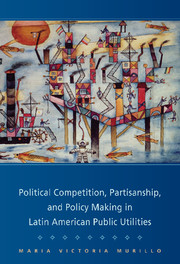Book contents
- Frontmatter
- Contents
- List of Acronyms
- Acknowledgments
- Introduction
- 1 Voice and Light
- 2 Political Competition and Policy Adoption
- 3 Casting a Partisan Light on Regulatory Choices
- 4 Postreform Regulatory Redistribution in Chile
- 5 Postreform Regulatory Redistribution in Argentina and Mexico
- 6 A Multilevel Analysis of Market Reforms in Latin American Public Utilities
- 7 Conclusion
- References
- Index
- Titles in the series
6 - A Multilevel Analysis of Market Reforms in Latin American Public Utilities
Published online by Cambridge University Press: 05 June 2012
- Frontmatter
- Contents
- List of Acronyms
- Acknowledgments
- Introduction
- 1 Voice and Light
- 2 Political Competition and Policy Adoption
- 3 Casting a Partisan Light on Regulatory Choices
- 4 Postreform Regulatory Redistribution in Chile
- 5 Postreform Regulatory Redistribution in Argentina and Mexico
- 6 A Multilevel Analysis of Market Reforms in Latin American Public Utilities
- 7 Conclusion
- References
- Index
- Titles in the series
Summary
This book builds on a new generation of comparative studies of Latin American market-oriented reforms that focus both on specific policies and increasingly on those policies' medium-term effects rather than on the adoption of general reform packages. Seeking to understand policy decisions and their consequences for subsequent political dynamics, this study shows that despite the appearance of policy convergence around the privatization of public utilities in Latin America at the end of the twentieth century, political incentives were crucial in explaining the timing and the content of policy decisions in telecommunications and electricity, two technically complex and capital-intensive sectors. This chapter summarizes the empirical findings of the previous four chapters while explaining the advantages provided by the research design of this book to identify causal mechanisms. It concludes by drawing lessons from the effects of electoral competition and partisan linkages in public-utility reform for the more general literature on Latin American policy making. Moreover, it discusses the implications of cross-sectoral reform legacies for our understanding of institutional evolution in the region.
Bringing the Pieces Together in a Multilevel Analysis of Policy Making
The research design used to study public-utility reforms and policy making in the aftermath of these reforms in the preceding chapters is based on a multimethod approach that combines a duration analysis of reform adoption with comparative case study research for regulatory content and postreform regulatory redistribution.
- Type
- Chapter
- Information
- Political Competition, Partisanship, and Policy Making in Latin American Public Utilities , pp. 226 - 244Publisher: Cambridge University PressPrint publication year: 2009

